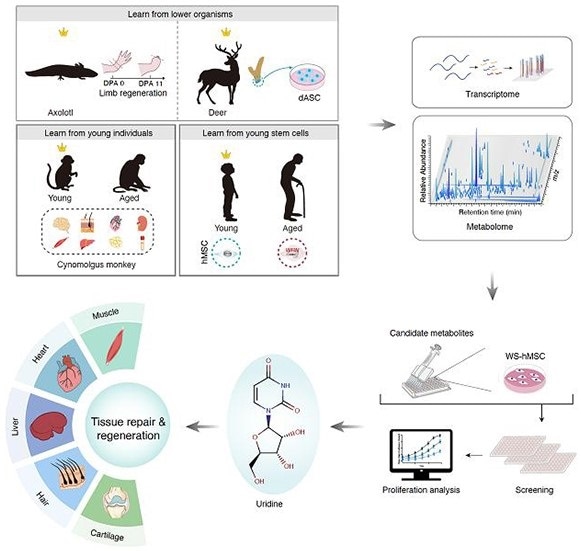Reviewed by Danielle Ellis, B.Sc.Feb 14 2022
The Chinese Academy of Sciences’ Institute of Zoology and Beijing Institute of Genomics partnered to recognize uridine as a pro-regenerative metabolite that highlighted human stem cell activity and improved restructuring and tissue repair in various tissues in mammals. The study was published on February 1st, 2022, in the journal Cell Discovery.

Identification of key metabolic small molecules that promote multi-tissue repair and delay aging through cross-species and cross-age metabolome profiling. Image Credit: Institute of Zoology.
Regeneration is a vital process that restores or replaces disrupted, diseased, or older tissues. Although regenerative capacity drops with progression and age, the molecular mechanism influencing the decline remains unknown.
Metabolites, unlike proteins, have a fairly similar structure across species, making metabolism an effective research field for studying evolutionarily conserved biology. Despite this, little is recognized about the small-molecule metabolites that have the ability to regulate aging and regeneration procedures.
By combining metabolomics and transcriptomics strategies, the scientists found multiple cross-species and cross-age metabolic programs correlated with elevated regeneration, including polyamine metabolism, pyrimidine metabolism (containing uracil), and fatty acid metabolism processes.
The researchers used the human stem cell aging research system to screen for natural metabolite candidates with regeneration-promoting prospects and discovered that uridine neutralized cellular senescence in both physiologically and pathologically senescent cells.
Uridine supplementation was designed to boost regeneration or rebuild various tissues in vivo, such as skeletal muscle, heart, liver, skin, and articular cartilage. In particular, in the muscle injury model, uridine enhanced muscle regeneration and repair, reduced inflammation, and provided uridine-treated mice with greater grip strength and locomotive function.
Uridine alleviated acute inflammation and enhanced the contractility of the injured heart in the myocardial infarction model. Uridine alleviated carbon tetrachloride-induced liver fibrosis and recovered liver function in the liver fibrosis model. Uridine stimulated anagen hair growth in the hair regeneration model. Uridine supported articular cartilage regeneration in the arthritis model, as well as optimized grip strength and locomotive function in mice.
Furthermore, researchers discovered that uridine was more abundant in young people’s plasma than in old people’s plasma. Moreover, oral uridine supplementation increased the physical activities of physiologically aged mice.
However, the researchers demonstrated that supplementing aged mice with single metabolite uridine reduced stem cell senescence, promoted tissue regeneration and repair, and increased physical activity.
This research uncovers earlier unexplained metabolism-associated regeneration precepts across species, opening up new possibilities for metabolic intervention in tissue repair, restoration, and aging.
Source:
Journal reference:
Liu, Z., et al. (2022) Cross-species metabolomic analysis identifies uridine as a potent regeneration promoting factor. Cell Discovery. doi.org/10.1038/s41421-021-00361-3.